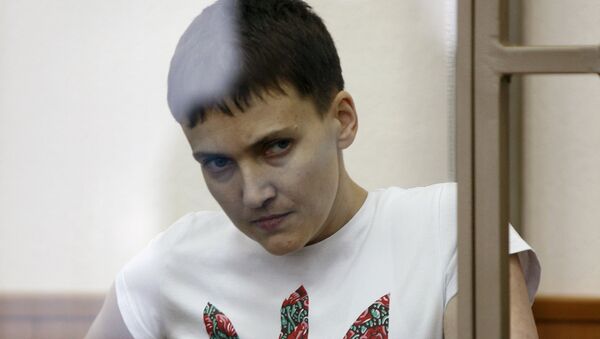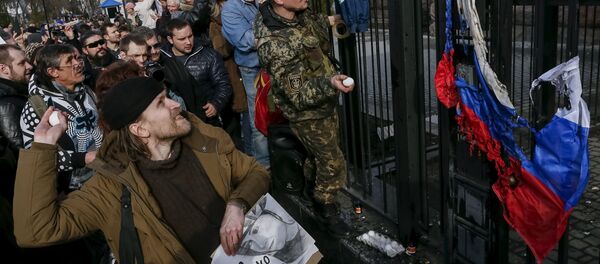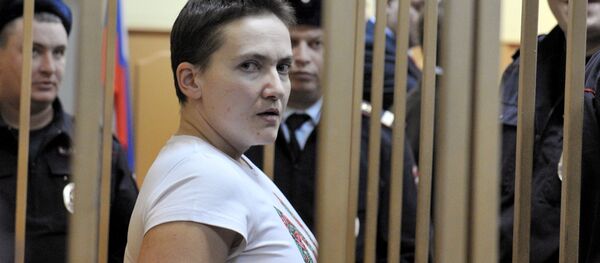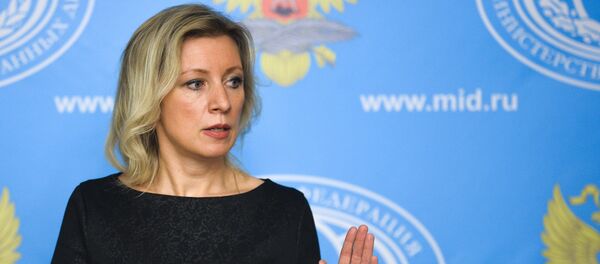MOSCOW (Sputnik) — A ruling in a case of detained Ukrainian national Nadezhda Savchenko, who is suspected of helping direct artillery fire that resulted in death of Russian reporters in 2014 is expected to be announced in a Russian court on March 21-22.
On July 9, 2014, the Russian Investigative Committee administration for the investigation of crimes involving the use of prohibited means and methods of warfare charged the Ukrainian national under Article 33, Part 5 and Article 105, Part 2, Points A, B, E, F and L of the Russian Criminal Code (complicity in the killing of two or more people in the line of duty committed by means dangerous to the public on grounds of political hatred committed by a group of persons).
Upon the investigation’s request, the court ordered Savchenko to be taken into custody pending trial.
In April 2015, the final charge was brought against Savchenko. In addition to complicity in the killing of two journalists, she was charged with illegal entry into Russia.
The investigation claims it has gathered incontrovertible evidence pointing to Savchenko’s direct involvement in these crimes, including an on-site forensic examination that confirmed that she could have accomplished the mission of directing artillery fire on the ground near the town of Metallist. These are the results of the ballistic examination of shrapnel removed from the bodies of the dead, which confirmed that those were shells fired from D-30 howitzers. The case materials also include Savchenko’s handwritten notes and her map of the area pointing to her role in the combat operation, investigators said.
On July 13, 2015, it became known that factoring in the evidence, the investigators redefined the case against Savchenko, and now she would be held accountable not as an accomplice, but as a co-perpetrator in the killing of two or more people committed by means dangerous to the public on grounds of political hatred committed by a group of persons acting in collusion.
According to a psychiatric examination, Savchenko is "mentally stable."
Savchenko’s case has been separated from the general criminal case of genocide perpetrated by Ukrainian law enforcement and security services and the use of prohibited means and methods of warfare.
Savchenko’s case was forwarded for consideration on merit to the Donetsk City Court of Russia’s Rostov Region.
Savchenko says she is not guilty and insists that she has been wrongfully imprisoned. Her defense lawyers also assert that the case has been fabricated, the investigation has no evidence proving Savchenko’s involvement in the killing of journalists and she did not cross the Russian border, but was in fact abducted.
Savchenko’s defense team contends that, as a PACE delegate, she has absolute immunity. Nevertheless, the court supported the investigators’ position, specifically that Savchenko’s immunity does not apply to actions committed before she acquired her status as an assembly delegate, while the crimes imputed to the Ukrainian national were committed before the elections.
In mid-December 2014, Savchenko declared a hunger strike, demanding repatriation. In early March 2015, she suspended her hunger strike, but later resumed it.
Subsequently, while not officially terminating the hunger strike, Savchenko started eating cottage cheese, butter and bread and drinking sweet tea.
Savchenko’s case is under the close scrutiny of Ukrainian and European rights advocates. Ukrainian, European and US politicians have repeatedly demanded Savchenko’s release.
On July 30, 2015, the Donetsk City Court held a preliminary hearing on the case. Savchenko’s lawyers asked for the trial to be moved to Moscow.
Savchenko’s lawyer Ilya Novikov attributed the need for the trial to be moved to Moscow to the high costs, including transport costs and compensation to the witnesses living in Voronezh and Moscow. According to Novikov, if she is found guilty, Savchenko will have to bear all of the costs. He also cited security considerations. Savchenko’s defense argues that the safety of the parties to the trial cannot be duly ensured in the Rostov Region, in close proximity to Ukraine’s conflict-torn Donbas region.
The issue of jurisdiction was considered by the Rostov Regional Court, which, on August 21, rejected a plea from the defense team and returned the case to the Donetsk City Court.
On September 15, the Donetsk court held a preliminary hearing of Savchenko’s case. The defense requested that her case be considered by a panel of three judges.
The prosecution agreed with the defense.
Savchenko’s defense lawyers also said they will appeal the provision whereby female defendants in Russia may not have a jury trial in the Constitutional Court. This form of trial is only allowed for defendants facing life in prison, but as women are not sentenced to life in prison they may not have a jury trial.
On February 25, 2016, the Constitutional Court ruled that the provision of the Code of Criminal Procedure depriving women of the right to opt for a jury trial is discriminatory and made it incumbent on lawmakers to amend the law accordingly. However, a case that is already in court may not be reviewed by a jury.
The case is considered by a troika of professional judges.
During the trial, the defendant dismissed the charges against her as "nonsense and lies" and protested her innocence. She admitted that she had to kill people who she considered enemies. Savchenko also said she had issued instructions by phone not to fire on roads and bridges and aim to the left or right of certain places but she does not regard this as directing fire.
During follow-up questioning, Savchenko said she had never felt hatred for Russian-speaking people or Russians, had not officially been a member of Aidar and had not been trained in directing artillery fire.
Meanwhile, two witnesses – Alexei Langavy, an employee of the Special Protection Service, a paramilitary organization from the self-proclaimed Luhansk People’s Republic, and reporter of Russia's NTV broadcaster Alexander Tokarev – alleged at the trial that Savchenko had in fact admitted that she was a spotter.
Igor Plotnitsky, the head of the Luhansk People’s Republic, was questioned as a trial witness in camera.
On December 17, the Donetsk court extended Savchenko’s custody until April 16. Later, the Rostov Regional Court upheld the decision.
During the preliminary investigation, Savchenko went on a hunger strike lasting several months with breaks in the protest against her prosecution.
On March 2, during the pleadings, the prosecutor asked the Donetsk court to sentence Savchenko to 23 years in prison for her involvement in the killing of two journalists in Donbas, just two years shy of the maximum sentence that can be imposed on women in Russia.
The injured parties in the case – Luhansk civilians who came under artillery fire and the relatives of the dead journalists – refused to participate in the trial although they could also have asked the court for a specific sentence to be handed down. They also did not sue the defendant for financial or moral damages.
On March 3, Savchenko went on full hunger strike, refusing both food and fluids, in protest against her final statement being adjourned for six days.
On March 9, in her final statement, Savchenko dismissed the charges brought by the Investigative Committee.
Savchenko demands to be returned to Ukraine. In her final statement, she reminded Ukrainian President Petro Poroshenko about his pledge to bring her home by May 2015. Russian authorities said they had received no requests regarding Savchenko’s exchange for any of the Russian nationals arrested in Ukraine. For his part, Poroshenko also said that Kiev has not received any swap proposals but is ready for them.
On March 10, it became known that Savchenko had ended her full hunger strike. After the verdict is delivered on March 21-22, she intends to resume it.







